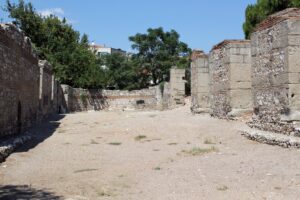
By Philippe Sterling
Jesus judged the church at Sardis that was asleep.
Have you ever had a “wake-up call”? Figuratively speaking, a wake-up call is something that grabs a person’s attention, alerting him to the seriousness of a matter and moving him to corrective action.
Have you ever attended a dead church? The services are dull and lifeless. Everyone is bored and nodding off to sleep. The Lord said to the church at Sardis that was ready to die, “Wake up!”
DESTINATION
The fifth church of Revelation 2-3 was in Sardis, about 30 miles south of Thyatira. It was a commercial city at the junction of five roads, perched on a plateau, 1,500 feet above a valley at the western end of the Great King’s Highway from Susa.
Sardis had a great history, but it was going downhill. It had been the ancient capital of Lydia, but its greatest glory was in the past.
In the sixth century BC, King Croesus of Sardis had amassed vast golden treasures. The city had a strong fortress. Despite its great fortress and steep cliffs, Sardis was caught off guard and captured multiple times, most notably by the Persians and later by the Greeks.
The town had begun building a massive temple to the goddess Artemis. It would have been as great as the one at Ephesus, but the town never completed the construction.
On the skyline of Sardis was a massive cemetery with thousands of burial mounds. The city seemed to have a preoccupation with death.
There was a substantial wool industry in Sardis, which may explain the references to clothing in the passage. The people may even have taken on the lethargic attitude of the sheep they tended.
In Roman times, Sardis was a minor city in comparison to the coastal cities of Ephesus and Smyrna. An earthquake hit it in AD 17, and it never fully recovered.
As Sardis had fallen because of a lack of vigilance, so also was the church in danger of falling. As the city flourished and decayed, so also had the church. The believers had grown indifferent to spiritual things and declined over the years.
PORTRAYAL OF JESUS
Jesus described Himself as the one who held the seven spirits and seven stars. The sevenfold character of the Holy Spirit rested upon Jesus, enabling Him to exercise righteous judgment (Isa 11:2-5). He held the leaders of the churches accountable to Him.
PRAISE FOR THE CHURCH
There was no praise for this church. Later in the letter, there was recognition of the few faithful in Sardis, but the church as a whole was failing.
CRITICISM OF THE CHURCH
Jesus knew the deeds both in reputation and reality of the believers in Sardis. He said, “You have a name that you are alive, but you are dead.” This was true of the city. It was also true of the church. This searching judgment of Christ may also apply to churches today.
When I lived in Arlington, VA, I used to go to the Smithsonian Museum of Natural History in Washington, DC, and look at the exhibits of the animals of North America. They looked lifelike in their natural habitat, but they were dead. Note, though, that they had once been alive and vibrant. We can have eternal life and yet allow our faith to wither and die (Jas 2:17 and 26).
EXHORTATION
The Lord gave an exhortation that provided the answer to escaping the spiritual graveyard (vv 2-3). Five commands comprise the exhortation.
First, “Wake up!” Perhaps the believers of the church were sleeping in the sense of not growing in their faith and not caring for the spiritual needs of those around them.
Second, “Strengthen the things that remain, that are ready to die!” They had apparently taken the first few steps of the Christian life, but they had not progressed to maturity.
Third, “Remember!” This was not a simple recall. The basis for renewal is to bear constantly in mind that which we have received and heard.
Fourth, “Keep!” Keep on keeping the body of truth just alluded to in connection with the receiving and hearing. Rebuild on what was left from the earlier days of fruitfulness.
Fifth, “Repent!” Turn from spiritual apathy to spiritual watchfulness (Eph 5:6-14; 1 Thess 5:1-11). Sentries are to stay awake and watch.
Become vigilant and diligent about your walk with Christ. Wake up and revitalize the good things you have going for you. If you don’t, what you have will “die.” Maintain a living faith.

PENALTY OR REWARD
If the church did not wake up, Jesus said that He would come suddenly, like a thief, to judge them. The earlier verses introduced a remedy for the dying condition of the church. This verse posed a threat for not accepting the remedy. Failure to wake up (watchfulness) exposed them to a possible surprise coming of the Lord in temporal judgment.
It may also be a reference to the Rapture. Contributing to the sin of the church may have been a failure to watch for the Lord’s return. A possible negative outcome at the Judgment Seat of Christ serves as an incentive for believers to wake up and stay alert (1 John 2:28).
The history of Sardis would have warned the believers concerning sudden and unexpected judgment. Sardis had twice fallen because of overconfidence and failure to watch. In 549 BC, the Persian King Cyrus had ended the rule of Croesus by scaling the cliffs under cover of darkness. In 214 BC the armies of Antiochus the Great captured the city by the same method. Herodotus tells of the incident with Cyrus.
Sardis was considered an impregnable fortress. It was built on the slope of Mount Tmolus, at the base of which ran the Pactolus River. Like a pier jutting out from Mount Tmolus was a ridge of rock with great cliffs on either side. On that high pier of solid rock Sardis had built its impregnable fortress. When Cyrus besieged the city, he could not advance farther until that fortress was taken. So the Persian general said that if any man would find a way to storm the fortress and overwhelm it, he would give large rewards.
A Mardian soldier by the name of Hyroeades was standing one day watching the cliff and the battlement on top and a Lydian soldier on top of the battlement. As he watched, the Lydian soldier accidentally dropped his helmet over the battlement and picked his way slowly to the base of the cliff to recover his helmet and climbed back to his place of sentinel duty. The Mardian soldier carefully watched as the Lydian came down and back up, and that night with a picked band of Persian soldiers, he made his way up to the height. It was unguarded, and Sardis fell into the hands of the Persians.
With that story as background, we can see the emphasis of Jesus when he said, “Be watchful . . .if you don’t watch, I will come like a thief.”
Some believers had not soiled their clothes. Believers soil their clothes when they walk in the ways of the ungodly world. The church had a reputation for being alive, but only a few of its number lived up to that reputation.
We find no mention of persecution in the passage. It is possible the local authorities didn’t care about the church. Most of the believers were going with the flow, perhaps offering incense to the emperor just to fit in, taking part in the pagan feasts to be “good citizens.”
PROMISES TO OVERCOMERS
Jesus promised the overcomer three things.
First, the overcomer will walk with Christ in white garments, the symbol of righteous acts (Rev 19:8). This is not the imputed righteousness of Christ given to all who believe in Him for everlasting life. This is an added reward reflected in royal clothing. The word “white” can have the meaning of “bright and shining.” Like a bright and shining diamond, the garments will have many colors and hues reflecting the overcomer’s devotion and service to Christ in this life.
Second, Jesus will keep the overcomer’s name in the Book of Life. The overcomer in Revelation is the believer who is faithful until physical death or the Rapture. The “name” can refer to a person’s self or reputation. The immediate context indicates the meaning. In Rev 13:8 and 17:8, for example, “name” refers to a person’s self. In the context discussed here, removing the “name” from the Book of Life may be the removal of a commendable reputation. The overcomer can gain a new name (see 2:17), a praiseworthy reputation or title which conforms to his faithfulness. The program at my Dallas Theological Seminary’s graduation ceremony contained the names of all the graduates. Next to some of the names were stars: one star, two stars, or three stars, representing graduating with honor, high honor, or highest honor, respectively.
In addition, Jesus may also have used the figure of speech litotes, an understatement in which “I will confess his name before My Father and before His angels.” an affirmative is expressed by the negative of its contrary, such as saying, “you won’t be sorry” and meaning, “you’ll be glad.” By saying that He would not remove the overcomer’s name from the Book of Life, Jesus meant that He would highlight the overcomer’s commendable reputation.
The third promise of Jesus clarified this, “I will confess his name before My Father and before His angels.” Jesus will declare the overcomer’s commendable reputation before the Father and His angels. If we are faithful to the end, Jesus will tell the story of our faithfulness, and it will reverberate from mouth to mouth throughout all future ages.
GENERAL ADMONITION
The Lord ended all seven letters with this general admonition: “He who has an ear, let him hear what the Spirit says to the churches.”
CONCLUSION
What would Jesus say (WWJS) to the sleeping church? He’d say, “Wake up! Watch for My soon return and make a name for yourself.”
_____________________
Philippe Sterling is the pastor of Vista Ridge Bible Fellowship in Lewisville, TX. He and his wife, Brenda, have a son and daughter and several grandkids.



